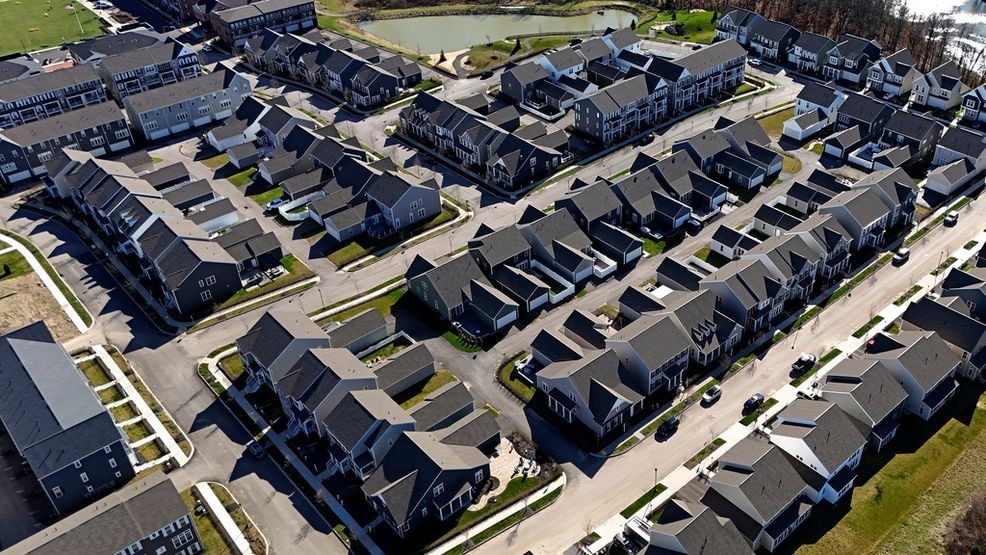WASHINGTON (TNND) — Home prices hit a record high last month even with a prolonged freeze on the housing market with buyers opting out of deals or out of the market entirely as affordability issues hold down sales and keep Americans out of homeownership.
Despite another dip in sales of existing homes, prices reached another record high for the month of June at $435,000, the National Association of Realtors said on Wednesday. Home prices have increased for 24 consecutive months despite three years of struggling sales due to high prices and interest rates pushing would-be buyers back to the sidelines.
Prices have continued to climb because there has not been enough construction of new homes to keep up with the country’s population. The rate at which prices have jumped has decreased as the market has cooled and more homes sit on the market, but new home supply has not improved enough to keep costs from reaching new heights.
High mortgage rates have made it even harder for buyers to afford homes with higher price tags compared to several years ago. Average rates on 30-year mortgages have been hovering near 7% for months, which adds hundreds of dollars to a monthly payment compared to the pandemic-era rates of below 3%.
“Typically, what happens in these cases is a market correction, and we are starting to see that in some of the most overbuilt areas in the hottest markets of the COVID era like Austin, Texas and many places in the Southeast. The affordability challenges due to higher rates are keeping prospective buyers on the sidelines, and inventory is building up and will need to be reduced in price to clear the market,” said Emanuel Santa-Donato, SVP and chief market analyst at Tomo Mortgage.
Most homeowners were also able to lock in low rates during the pandemic by buying new homes or refinancing their existing mortgage, reducing incentive for them to sell their home even with the steep increases in equity.
President Donald Trump has blamed Federal Reserve chair Jerome Powell for the struggling housing market over the central bank’s refusal to cut interest rates over the last six months. Trump has frequently gone after Powell and publicly mused about trying to remove him from his position over the Fed’s rate decisions.
The Fed’s benchmark interest rate has been stuck in place since last fall so officials can see what impact Trump’s tariffs have on an economy that has mostly held strong against a string of headwinds with low unemployment and stable inflation. Economists are widely predicting Trump’s tariff agenda to increase prices and ramp up inflation in the coming months, which was still above the 2% target before the trade actions were announced.
“Housing in our Country is lagging because Jerome ‘Too Late’ Powell refuses to lower Interest Rates,” the president wrote on Truth Social.
Mortgage rates are not directly tied to the Fed’s rate decisions but instead tend to follow the yield on 10-year Treasurys. Bond yields have been elevated since Trump returned to office and unleashed a wide range of tariffs that have put economists and investors on edge over fears of an economic downturn as a result of higher prices and trade wars.
“Some relief in mortgage rates will help spur activity as it is the quickest path to affordability, but home prices have been increasing more than incomes for so long a correction will be the healthier option. A drop in interest rates may even spur more home price appreciation,” Santa-Donato said.
Trump also said this week he is considering pushing for eliminating capital gains taxes on home sales to help boost the housing market. Under current law, sellers can be taxed once profits exceed $250,000 for single filers or $500,000 for couples, depending on taxable income.
“If the Fed would lower the (interest) rates, we wouldn’t even have to do that,” he said in the Oval Office. “But we are thinking about no tax on capital gains on houses.”
Rep. Marjorie Taylor Greene, R-Ga., introduced a bill to eliminate capital gains taxes on sales of primary homes earlier this month, though it’s unclear whether there will be momentum to pass it and if it could be financed after the “big, beautiful bill” was signed into law.
“Homeowners who have lived in their homes for decades, especially seniors in places where values have surged, shouldn’t be forced to stay put because of an IRS penalty,” she said in a statement. “My bill unlocks that equity, helps fix the housing shortage, and supports long-term financial security for American families.”
Some industry groups have long advocated for reforms to the capital gains tax on home sales and increasing the caps. They argue that current caps, which have not been adjusted for inflation or increases to home values since 1997, are another incentive for homeowners to avoid selling.
A report published by NAR earlier this year estimated that nearly one-third of homeowners already have enough equity to exceed the $250,000 cap, while another 10% may have enough to hit the top threshold. Those levels are expected to continue to climb as home values continue to appreciate amid the housing shortage.
“At a time when many of these homeowners are considering downsizing or moving to a retirement facility, more and more are facing gains well in excess of the exclusions, which can leave them owing many thousands of dollars in taxes and reduce their ability to afford a new home,” NAR’s report says.
Another analysis by The Budget Lab at Yale University released on Tuesday said eliminating the capital gains tax on home sales would predominantly benefit sellers who are older and wealthier.

